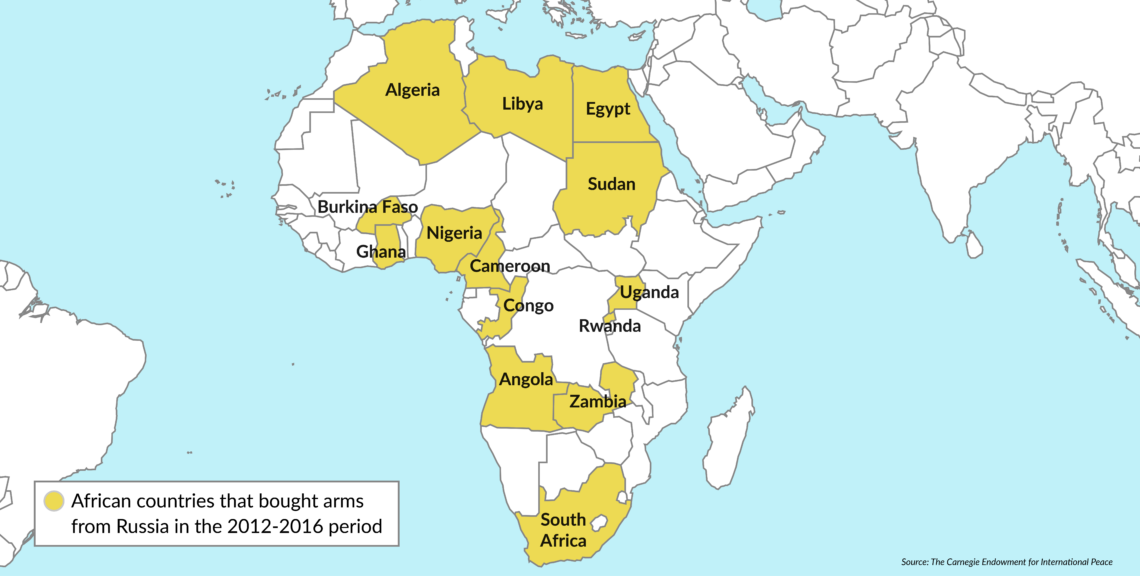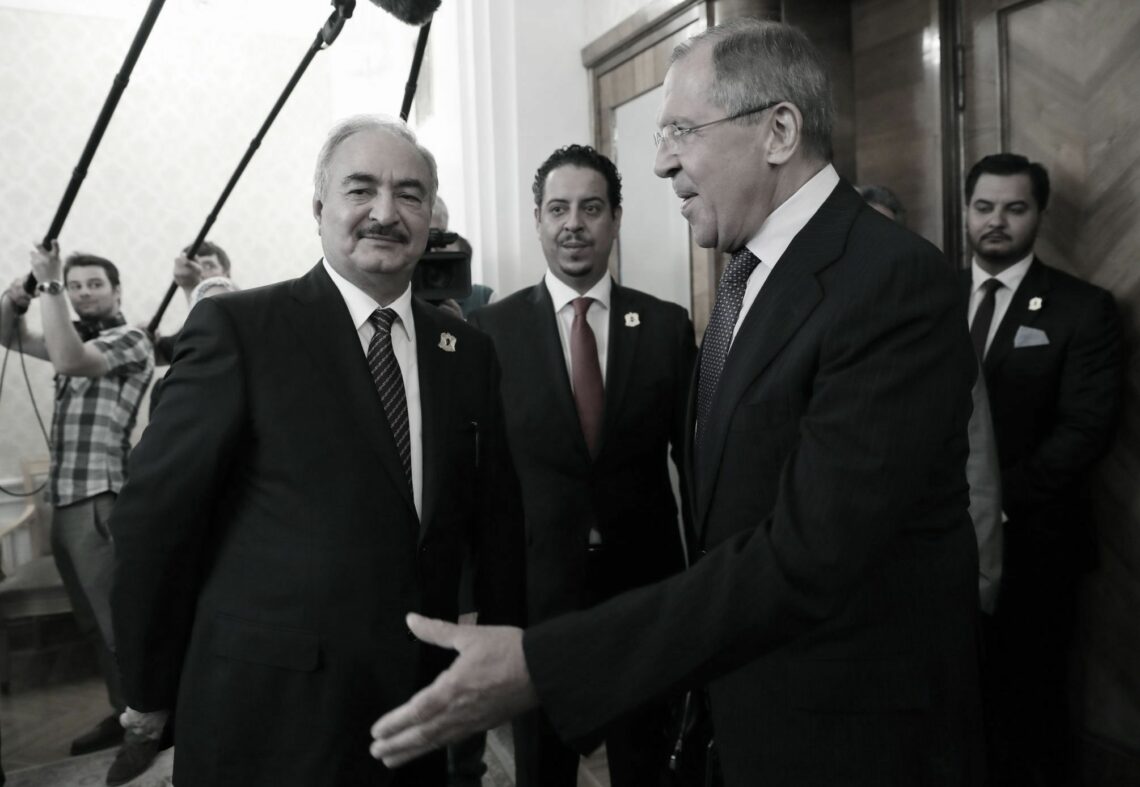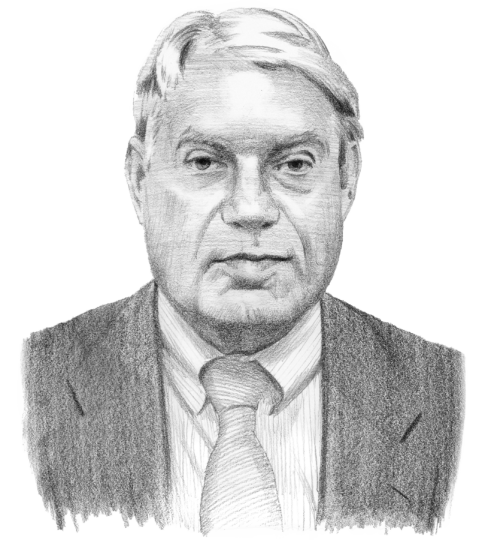Russia returns to Africa
Russia is making a big push for closer relations with Africa. It aims to gain access to energy resources and in return offers military support and arms sales. Its goals are not only economic. It wants to show the world that it is still a global power, as well as challenge the U.S., Europe, and China as they make their own inroads on the continent.

In a nutshell
- Russia has showed renewed interest in strengthening ties with Africa
- Access to energy resources is repaid with military support and arms sales
- Moscow wants to show its own people that it is indeed a global power
- It also wants to challenge the West wherever possible
Africa was a prominent theater for Soviet initiatives during the Cold War. With the collapse of the Soviet Union, it appeared that Russian interest in Africa all but died. For years, the new state lacked the capacity to sustain any kind of substantial engagement with African states, though occasionally Russian President Vladimir Putin or one of his foreign ministers would make a tour of the continent to reassert Russian interests.
Those days are over. Russia is returning to Africa and using all of its instruments of power, including diplomacy, energy investments, and scholarships to Russian universities for African students. It often conceals its presence through so-called “private” institutions that are really controlled by the state. One such entity, a private military company (PMC) called the Wagner Group, has been deployed to the Central African Republic to support that country’s government against local insurgents.
In Rwanda, President Paul Kagame recently asked President Putin for more energy deals, arms sales and slots for college students in Russian schools. Other states, like Sudan, have also explicitly combined appeals for what Russia calls “military-technical cooperation” – that is, arms sales and support for Russian air and/or naval bases in their countries. South Africa has very close relations with Russia through common membership in the BRICS group. Russian diplomats now eagerly travel around Africa to advance their brand.
Energy, mining and other sectors
Russian Foreign Minister Sergei Lavrov has already made two major tours of Africa this year, but Russia’s offensive on the continent precedes those visits. Already in 2015, RT Global Resources, a subsidiary of Rostec State Corp., Russia’s huge corporation for arms sales and other infrastructural projects, headed by Putin ally Sergey Chemezov, won a $30 million contract for a new oil refinery in Uganda. Rostec is spearheading a drive to increase Russia’s access to African governments, as well as its energy and minerals, thereby fostering trade and boosting domestic employment. African markets have become much more important to Russia since the implementation of Western sanctions in 2014.
Russia often uses promises of arms sales to gain entry into African countries’ energy and mining sectors.
In countries like Mozambique, with huge natural gas reserves, Russia has shown intense interest. A man known as “Putin’s chef,” Yevgeny Prigozhin, a restaurateur who receives large-scale state catering contracts and who, according to U.S. intelligence sources, recruited the Wagner Group for an ill-fated Syrian mission, is investing in large-scale gold mining operations in Sudan.
Russia often uses debt forgiveness, development assistance and promises of arms sales to encourage African leaders to grant its companies entry into their energy and mining sectors. Defense-related technologies like satellites also figure in Russian business deals with African countries like Angola. Such agreements also bring other opportunities for sales in the telecommunications sector. Russian diplomats have stated that the country also wants to stimulate bilateral trade and investment in the transport and agriculture sectors, as well as in nuclear energy.
Military ties
Russian military intelligence, the GRU, is clearly increasing its presence in Africa. In 2014, Russia and South Africa jointly launched a satellite that provides surveillance for the entire continent. South African and Russian military intelligence were reported to be the “key role players” in this project. In Egypt and Libya, the Russian military presence is so substantial that Moscow is seeking air and naval bases like those it had some 40-50 years ago.
In Libya, Russia provides the rebel Libyan government in Tobruk, under General Khalifa Haftar, with military advice and diplomatic support at the United Nations. In 2016, Russia printed nearly 4 billion dinars ($2.8 billion) for Libya’s Central Bank and then transferred the money to a branch loyal to the Tobruk government. General Haftar has frequently visited Moscow and held conferences with Defense Minister Sergei Shoigu. All this has also led to talk about a potential Russian base in Libya, something that Stalin also sought in 1945.

Russia has been eager to strengthen ties with Rwanda, a real military power in central Africa, and to prevent it and France from hurting Russian interests in the Democratic Republic of the Congo. In 2014 Moscow signed an agreement to provide Kinshasa with military equipment and weapons.
Reasons behind the surge
There are several reasons for Russia’s surge of activity throughout Africa. First, the closure of Western sources of trade, investment and financing have forced it to look to Africa. Second, Moscow was aware that China, India, the U.S. and the European Union had all established strong and competitive presences on the continent, and that it was in danger of being marginalized there.
Third, Russia’s return to Africa is tied to its deep-rooted belief that it is a great global power – which by definition must be present across the world. There are psychological and political motives at play here. Demonstrating Russia’s influence in Africa shows domestic audiences that Russia under President Putin is truly the great power it claims to be.
Moreover, Moscow must become involved in Africa not only to exploit its riches but also to prevent it from coming under the influence of the Western “pole” in Russia’s “multipolar” world. Russia’s success in becoming a major power broker in the Middle East has both facilitated its reach and stimulated its appetite to take advantage of opportunities in Africa.
Russia’s grand strategy is to become the ‘supreme balancing force’ in Afro-Eurasia.
Finally, many Russian foreign policy analysts believe that Washington is in retreat and that Russia is winning in world politics. They say that Russia’s grand strategy is to become the “supreme balancing force” in Afro-Eurasia by skillful use of diplomatic intervention in the region’s territorial conflicts. Here again, success in the Middle East and the heady elixir of great power status drive behavior that aims to prove the view that Russia really is a great global power, if not a superpower, in the multipolar order and must conduct itself accordingly.
Strategic objectives
Based on these factors and what Russian diplomats and commentators themselves have said, we can discern Moscow’s goals. We must remember that while trade, investment, and business opportunities may have intrinsic value, in Russia’s strategic calculus they come second to or serve as a means for larger political and strategic objectives.
In his March visit to Africa, Foreign Minister Lavrov made clear the underlying strategic impetus of Russia’s policy. The positions Mr. Lavrov espoused resemble those Moscow has used to win friends and influence in Latin America. These include investment and energy projects (including nuclear energy), arms deals, appeals to the regions’ self-importance and offers to cooperate on UN reform. All of this is aimed at weakening these countries’ ties with the West.
There is a broader and deeper message that Moscow wishes to impart to African and other external audiences. On his March trip to Africa, Foreign Minister Lavrov signaled Russia’s desire to play a role like what it is now seeking – and to a large degree acquiring – in the Middle East, namely: a power broker to be consulted on all major regional issues. Mr. Lavrov commented that Moscow places great importance on boosting ties with African regional and subregional organizations, primarily the African Union. This also mirrors Moscow’s approach in Latin America. And as in the Middle East, Moscow is trying to take a major role in resolving many of the conflicts in Africa, even as it is increasing its arms sales to countries throughout the continent.
Russian interests go beyond merely mediating or helping to resolve conflicts. It uses its economic leverage to influence political outcomes. In Angola, on a recent visit by Nikolai Patrushev, secretary of Russia’s Security Council, Russia’s diplomats sought to advance theses “on the necessity of opposing color revolutions and destabilizing activities of the West.”
Moscow wants to show that it is a truly global power with a worldwide reach.
Moscow is even now inserting political operatives under Mr. Prigozhin’s direction into African countries where elections are taking place. This kind of operation elsewhere has revealed the close links between economic influence and the corruption of political sectors and institutions in targeted countries whether it be Europe, the U.S. or Latin America.
Comprehensive strategy
We are therefore seeing a comprehensive strategy on a continent-wide basis. It employs all the instruments of power: economic offers in key sectors, arms sales and the provision of private mercenaries to embattled governments, diplomatic support for regional and subregional organizations and political subversion, and information operations to support increased Russian influence.
One of the things that particularly rankles Russia’s leadership is the Western belief, famously stated by former U.S. President Barack Obama, that Russia is merely a regional power. Apart from convincing Africans that Russia is now back and ready to resume (at least in its own eyes) its past role in Africa, Moscow clearly wishes to make the point that it is a truly global power with a worldwide reach and capacity to influence foreign policies everywhere. Mr. Lavrov’s trip was a means to that end, showing the world that Russia is ready, willing and able to offer material benefits to African states that align themselves with Moscow.
In fact, the message is more than “Moscow is back, and a great global power, too.” Russia is giving notice that it intends to challenge Western positions in Africa to the best of its ability. The promises of investments, energy projects, arms sales, nuclear reactors and support for reform of the UN come along with requests to be recognized formally in regional security organizations, even though Russia is not an African power. In other words, it is part of an overall global policy to challenge the West. Regardless of whether Moscow claws back any lost ground in Africa, that challenge will continue.
Because we are only at the early stages of Russia’s efforts to influence the continent, we cannot tell what its consequences might be for Russia, Africa or the world. But as the ancient proverb that something new always comes out of Africa suggests, we may well be surprised by the consequences of Russian intervention in Africa.








